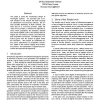Free Online Productivity Tools
i2Speak
i2Symbol
i2OCR
iTex2Img
iWeb2Print
iWeb2Shot
i2Type
iPdf2Split
iPdf2Merge
i2Bopomofo
i2Arabic
i2Style
i2Image
i2PDF
iLatex2Rtf
Sci2ools
112
click to vote
IJCAI
2003
2003
When Evolving Populations is Better than Coevolving Individuals: The Blind Mice Problem
This paper is about the evolutionary design of multi-agent systems. An important part of recent research in this domain has been focusing on collaborative revolutionary methods. We expose possible drawbacks of these methods, and show that for a non-trivial problem called the "blind mice" problem, a classical GA approach in which whole populations are evaluated, selected and crossed together (with a few tweaks) finds an elegant and non-intuitive solution more efficiently than cooperative coevolution. The difference in efficiency grows with the number of agents within the simulation. We propose an explanation for this poorer performance of cooperative coevolution, based on the intrinsic fragility of the evaluation process. This explanation is supported by theoretical and experimental arguments.
Classical Ga Approach | Collaborative Revolutionary Methods | Cooperative Coevolution | IJCAI 2003 | IJCAI 2007 |
| Added | 31 Oct 2010 |
| Updated | 31 Oct 2010 |
| Type | Conference |
| Year | 2003 |
| Where | IJCAI |
| Authors | Thomas Miconi |
Comments (0)

